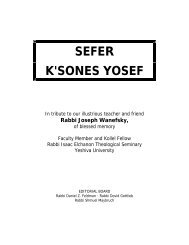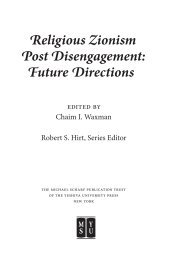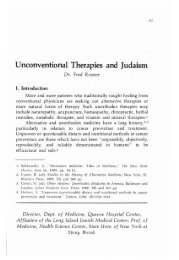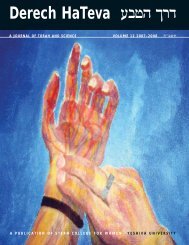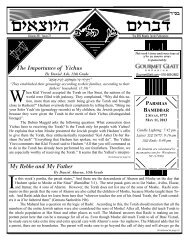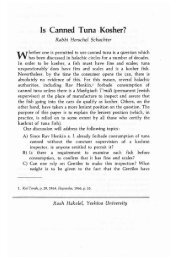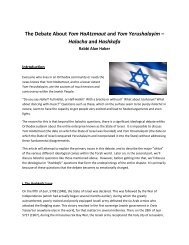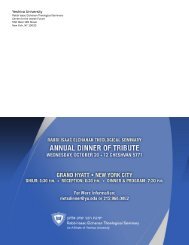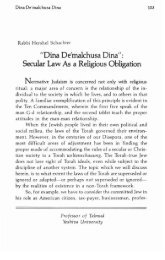yeshiva university • purim to-go • adar 5771 - YU Torah Online
yeshiva university • purim to-go • adar 5771 - YU Torah Online
yeshiva university • purim to-go • adar 5771 - YU Torah Online
- No tags were found...
Create successful ePaper yourself
Turn your PDF publications into a flip-book with our unique Google optimized e-Paper software.
Ignoring the military vic<strong>to</strong>ry seems quite unusual. After all, Purim ostensibly celebrates themiraculous triumph over our enemies, which unfolded on the thirteenth and fourteenth! Incontrast, for example, Shevi’i shel Pesach is celebrated on the seventh day of Pesach, the very dayour Egyptian <strong>to</strong>rmen<strong>to</strong>rs drowned in the sea. Why then was Purim not similarly established onthe day we defeated our enemies? Why do we celebrate the rest, as opposed <strong>to</strong> the vic<strong>to</strong>ry? 31Marking the Downfall of Our EnemiesIn his Meshech Chochmah (Shemot 12:16), Rabbi Meir Simcha of Dvinsk offers a beautifulapproach <strong>to</strong> Purim. Building upon the famous Midrash (Yalkut Shimoni Beshalach 233) inwhich Hashem forbids the angels from reciting shira upon keriat yam suf because "" , “My creations are drowning in the sea and you sing mypraises before me?” R. Meir Simcha posits that we celebrate the day of rest on Purim <strong>to</strong> stressthat we commemorate not the destruction of the enemy but the salvation of klal yisrael.מעשי ידיטובעים בים ואתם אומרים שירה לפניR. Meir Simcha further continues that we encounter the same phenomenon in connection withChanukah and Pesach, which similarly commemorate military vic<strong>to</strong>ries. Lighting the Menorahhighlights only the miracle of the oil, the rededication of the Temple and Hashem’s providence– not the military vic<strong>to</strong>ry – so as <strong>to</strong> avoid the possible misunderstanding that we celebrate thedownfall of the Syrian-Greeks.The Meshech Chochmah advances a similar thesis regarding Shevi’i shel Pesach. It seemspuzzling that Hashem instructed the Jews when they still remained in Egypt <strong>to</strong> abstain frommelacha on the seventh day:Seven days you shall eat Matzah. But on the first day you shalldestroy leavened bread from your homes. For anyone who shallשבעת ימים מצות תאכלו אך ביוםהראשון תשביתו שאר מבתיכם כי כלof Adar is “z’man kehila lakol,” “a time of gathering for all.” In what sense is the thirteenth a day of gathering, andhow does that justify reading the Megilla on that date? Rabbenu Tam (quoted in Rosh 1:1, Ran 1b be’Alfas)interprets this phrase <strong>to</strong> mean that the Jews gathered and fasted before they went out <strong>to</strong> war (according <strong>to</strong> RabbenuTam this Gemara in fact provides a Talmudic source for Ta’anit Esther), whereas Rashi (2a s.v. z’man) explains tha<strong>to</strong>n the thirteenth the Jews who had gathered for battle vanquished the enemy.At first glance Rashi’s explanation appears quite reasonable. The Ran (1b be’Alfas), however, rejects thisinterpretation, based on Tosafot who argue that the matter does not depend on war; rather, the Megilla made itdependent upon resting. Tosafot’s argument echoes the pesukim in the Megilla, which relate that Purim was in factestablished not on the day of vic<strong>to</strong>ry but on the day of rest.Rashi would presumably answer that although the original date of Purim was set on the day of rest, the day of war issufficiently important <strong>to</strong> justify setting that date as an alternative for reading the Megilla. Thus Tosafot maintainsthat the final day of battle is completely irrelevant, whereas Rashi holds that it remains significant, albeit on asecondary level.It is also interesting <strong>to</strong> note that the debate between Rashi and Tosafot seems <strong>to</strong> play out in the Talmud Yerushalmi(Megilla 1:1). At first the Yerushalmi claims that pure logic does not dictate reading the Megilla on the thirteenth,as it is the anniversary of the war and not the day of rest. Rather, we require a passuk <strong>to</strong> justify reading the Megilla onthis date. This follows the logic of Tosafot. However, the Yerushalmi’s conclusion seems <strong>to</strong> side with Rashi, arguingthat the vic<strong>to</strong>ry on the battlefield is at least sufficient <strong>to</strong> justify reading the Megilla on the thirteenth.31For an interesting approach <strong>to</strong> this problem see Rabbi Yehuda Shaviv, which is available on Yeshivat Har Etzion’sVirtual Beit Midrash at http://vbm-<strong>to</strong>rah.org/<strong>purim</strong>/pur58-ys.htm. Rav Shaviv links “menucha” on Purim <strong>to</strong> therest of Shabbat and especially <strong>to</strong> that of the messianic era, which will follow the destruction of Amalek.38YESHIVA UNIVERSITY <strong>•</strong> PURIM TO-GO <strong>•</strong> ADAR <strong>5771</strong>



